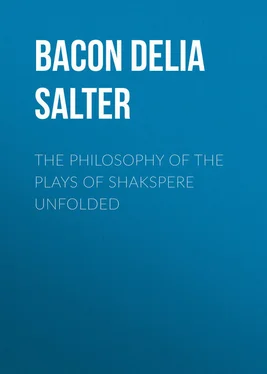Delia Bacon - The Philosophy of the Plays of Shakspere Unfolded
Здесь есть возможность читать онлайн «Delia Bacon - The Philosophy of the Plays of Shakspere Unfolded» — ознакомительный отрывок электронной книги совершенно бесплатно, а после прочтения отрывка купить полную версию. В некоторых случаях можно слушать аудио, скачать через торрент в формате fb2 и присутствует краткое содержание. Жанр: literature_19, foreign_antique, foreign_prose, на английском языке. Описание произведения, (предисловие) а так же отзывы посетителей доступны на портале библиотеки ЛибКат.
- Название:The Philosophy of the Plays of Shakspere Unfolded
- Автор:
- Жанр:
- Год:неизвестен
- ISBN:нет данных
- Рейтинг книги:3 / 5. Голосов: 1
-
Избранное:Добавить в избранное
- Отзывы:
-
Ваша оценка:
- 60
- 1
- 2
- 3
- 4
- 5
The Philosophy of the Plays of Shakspere Unfolded: краткое содержание, описание и аннотация
Предлагаем к чтению аннотацию, описание, краткое содержание или предисловие (зависит от того, что написал сам автор книги «The Philosophy of the Plays of Shakspere Unfolded»). Если вы не нашли необходимую информацию о книге — напишите в комментариях, мы постараемся отыскать её.
The Philosophy of the Plays of Shakspere Unfolded — читать онлайн ознакомительный отрывок
Ниже представлен текст книги, разбитый по страницам. Система сохранения места последней прочитанной страницы, позволяет с удобством читать онлайн бесплатно книгу «The Philosophy of the Plays of Shakspere Unfolded», без необходимости каждый раз заново искать на чём Вы остановились. Поставьте закладку, и сможете в любой момент перейти на страницу, на которой закончили чтение.
Интервал:
Закладка:
'A man must frame some probable cause , why he should not do his best, and why he should dissemble his abilities,' says this author, speaking of colour , or the covering of defects; and that the prejudice just referred to was not peculiar to the English court, the remarkable piece of dramatic criticism which we are about to produce from this old Gascon philosopher's pages, may or may not indicate, according as it is interpreted. It serves as an introduction to the passage in which the author's double meaning, and the occasionally double sound of his stories is noted. In the preceding chapter, it should be remarked, however, the author has been discoursing in high strains, upon the vanity of popular applause, or of any applause but that of reason and conscience; sustaining himself with quotations from the Stoics, whose doctrines on this point he assumes as the precepts of a true and natural philosophy; and among others the following passage was quoted: – [Taken from an epistle of Seneca, but including a quotation from a letter of Epicurus, on the same subject.] – 'Remember him who being asked why he took so much pains in an art that could come to the knowledge of but few persons, replied, "A few are enough for me. I have enough with one, I have enough with never a one." He said true; yourself and a companion are theatre enough to one another, or you to yourself . Let us be to you the whole people , and the whole people to you but one . You should do like the beasts of chase who efface the track at the entrance into their den .' But this author's comprehensive design embraces all the oppositions in human nature; he thinks it of very little use to preach to men from the height of these lofty philosophic flights, unless you first dive down to the platform of their actualities, and by beginning with the secret of what they are, make sure that you take them with you. So then the latent human vanity, must needs be confessed, and instead of taking it all to himself this time, poor Cicero and Pliny are dragged up, the latter very unjustly, as the commentator complains, to stand the brunt of this philosophic shooting.
'But this exceeds all meanness of spirit in persons of such quality as they were , to think to derive any glory from babbling and prating, even to the making use of their private letters to their friends, and so withal that though some of them were never sent, the opportunity being lost , they nevertheless published them; with this worthy excuse, that they were unwilling to lose their labour, and have their lucubrations thrown away.' – Was it not well becoming two consuls of Rome, sovereign magistrates of the republic, that commanded the world, to spend their time in patching up elegant missives, in order to gain the reputation of being well versed in their own mother tongue ? What could a pitiful schoolmaster have done worse, who got his living by it? If the acts of Xenophon and Caesar had not far transcended their eloquence, I don't believe they would ever have taken the pains to write them. They made it their business to recommend not their saying , but their doing . The companions of Demosthenes in the embassy to Philip, extolling that prince as handsome, eloquent, and a stout drinker, Demosthenes said that those were commendations more proper for a woman, an advocate, or a sponge. 'Tis not his profession to know either how to hunt, or to dance well.
Orabunt causas alii, coelique meatus
Describent radio, et fulgentia sidera dicent,
Hic regere imperio populos sciat.
Plutarch says, moreover, that to appear so excellent in these less necessary qualities, is to produce witness against a man's self, that he has spent his time and study ill, which ought to have been employed in the acquisition of more necessary and more useful things. Thus Philip, King of Macedon, having heard the great Alexander , his son, sing at a feast to the wonder and envy of the best musicians there. 'Art thou not ashamed,' he said to him, 'to sing so well ?' And to the same Philip, a musician with whom he was disputing about something concerning his art, said, ' Heaven forbid, sir, that so great a misfortune should ever befall you as to understand these things better than I .' Perhaps this author might have made a similar reply, had his been subjected to a similar criticism. And Lord Bacon quotes this story too, as he does many others, which this author has first selected , and for the same purpose; for, not content with appropriating his philosophy, and pretending to invent his design and his method, he borrows all his most significant stories from him, and brings them in to illustrate the same points, and the points are borrowed also: he makes use, indeed, of his common-place book throughout in the most shameless and unconscionable manner. 'Rack his style, Madam, rack his style ?' he said to Queen Elizabeth, as he tells us, when she consulted him – he being then of her counsel learned, in the case of Dr. Hayward, charged with having written 'the book of the deposing of Richard the Second, and the coming in of Henry the Fourth,' and sent to the Tower for that offence. The queen was eager for a different kind of advice. Racking an author's book did not appear to her coarse sensibilities, perfectly unconscious of the delicacy of an author's susceptibilities, a process in itself sufficiently murderous to satisfy her revenge. There must be some flesh and blood in the business before ever she could understand it. She wanted to have 'the question' put to that gentleman as to his meaning in the obscure passages in that work under the most impressive circumstances; and Mr. Bacon, himself an author, being of her counsel learned, was requested to make out a case of treason for her; and wishes from such a source were understood to be commands in those days. Now it happened that one of the managers and actors at the Globe Theatre, who was at that time sustaining, as it would seem, the most extraordinary relations of intimacy and friendship with the friends and patrons of this same person, then figuring as the queen's adviser, had recently composed a tragedy on this very subject; though that gentleman, more cautious than Dr. Hayward, and having, perhaps, some learned counsel also, had taken the precaution to keep back the scene of the deposing of royalty during the life-time of this sharp-witted queen, reserving its publication for the reign of her erudite successor; and the learned counsel in this case being aware of the fact, may have felt some sympathy with this misguided author. 'No, madam,' he replied to her inquiry, thinking to take off her bitterness with a merry conceit, as he says, 'for treason I can not deliver opinion that there is any, but very much felony.' The queen apprehending it gladly, asked, 'How?' and 'wherein?' Mr. Bacon answered, 'Because he had stolen many of his sentences and conceits out of Cornelius Tacitus.' It would do one good to see, perhaps, how many felonious appropriations of sentences, and quotations, and ideas, the application he recommends would bring to light in this case.
But the instances already quoted are not the only ones which this free spoken foreign writer, this Elizabethan genius abroad, ventures to adduce in support of this position of his, that statesmen – men who aspire to the administration of republics or other forms of government – if they cannot consent on that account to relinquish altogether the company of the Muses, must at least so far respect the prevailing opinion on that point, as to be able to sacrifice to it the proudest literary honours. Will the reader be pleased to notice, not merely the extraordinary character of the example in this instance, but the grounds of the assumption which the critic makes with so much coolness.
Читать дальшеИнтервал:
Закладка:
Похожие книги на «The Philosophy of the Plays of Shakspere Unfolded»
Представляем Вашему вниманию похожие книги на «The Philosophy of the Plays of Shakspere Unfolded» списком для выбора. Мы отобрали схожую по названию и смыслу литературу в надежде предоставить читателям больше вариантов отыскать новые, интересные, ещё непрочитанные произведения.
Обсуждение, отзывы о книге «The Philosophy of the Plays of Shakspere Unfolded» и просто собственные мнения читателей. Оставьте ваши комментарии, напишите, что Вы думаете о произведении, его смысле или главных героях. Укажите что конкретно понравилось, а что нет, и почему Вы так считаете.












